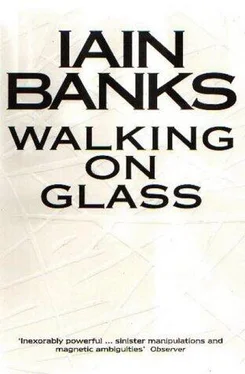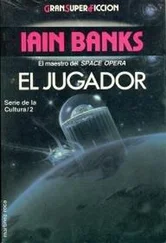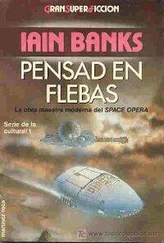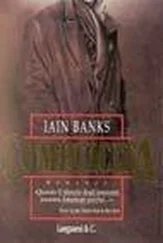Quiss had gone back to the games room, his old legs quite exhausted by the time he got back.
He said nothing to Ajayi.
He stood on the parapet of the balcony.
Yes, the red crow had been right. It did not know it, it could never have been sure, it had probably only dwelled on the awfulness of the dreamers" fate to bluff him into trying the experience out, so that it could leave him there, but it had been right, nevertheless, about the eventual effect of its revelation.
The thought of that low, limitless space beneath the castle had filled Quiss's thoughts - and, more importantly, his dreams - for almost a hundred days and nights since. A deep, dark depression had settled on him, weighing him down like some heavy suit of armour. He felt like some warrior, chain-mailed, stumbling into quicksand...
He could not keep his mind from dwelling on what he had seen, on the sheer extent of the place beneath them, that impression of claustrophobic infinity. So many people, so many failed hopes, lost games, surrendered dreams; and the castle, a single island of warped chance in a frozen ocean of missed opportunities.
That bright, beguiling image he had held on to all these days, of those brown arms, that blue sky, the single shining line of contrail; it returned only to hurt him now, taunt him in his dreams. In that deep, dark, echoless and echo-filled space far beneath him, his mind was already lost; sideless, wall-less the place, bottomless his despair.
His hope, his determination - once so fierce, so furious and powerful and energetic - had ground to a halt, rusted up; seized.
The castle's doing. That was its effect, on those within it as well as on itself. To grind down, to slowly, slowly abrade and at the same time fuse, wearing away and seizing up at once, like sand-laden water in some huge engine. He felt like that now. He felt like some grain of sand inside the place, no more important.
He stared down at the crags and snow far below him, rocked once back and forward on his feet, felt himself tremble. His jaw wanted to shake, but he clenched his teeth. The wind gusted, swaying him. Cold as a glacier , he thought, smiling grimly. A slow-flowing glacier. A fit image to take to his death, he thought, and remembered the room of flowed glass, the final straw which had eventually followed the red crow's revelation. That had been the real trigger, that was why he really stood here.
It was a room he had discovered, just that day, on one of his now infrequent walks. He had wandered, lost as usual, then he had come to a room inside the thick walls where the wind blew in and snow heaped on the glass floor under the windows.
In the window spaces there were the remains of metal frames; he noticed this as he went to the aperture to look out and so get his bearings from the landscape beyond (he should see the slate mines if his sense of direction was right, but it had been failing him with increasing frequency lately).
Something like clear tar had flowed from the almost empty frames, where only a thin edge of glass lay in the bottom of each hexagon of the metal frames. The glass under his feet was dark. He looked out of the windows, eyes narrowed against the cold, funnelled wind moaning quietly through the deep slit. The floor sloped slightly, up to the windows. Clear stuff, like ice, stuck to the walls under the windows. He stooped, grunting with effort, to examine it, finally got down stiffly to his knees, scraping at the floor (there was a slate floor just underneath the thin covering of glass). He tapped at the clear stuff still in the window frames above, then ran one finger down from the glass still in the frames, over the sill, down over the clear flow on the walls until finally his finger slid all the way down without a flaw, crack or join registering under his fingertip, to the floor.
The glass in the bottom of the frames, on the narrow sill, on the walls under the windows and on the floor of the room was joined. It was all one. He stayed kneeling and let his hands rest in his sloped lap. He stared ahead.
He recalled, from when he could not remember, that glass - ordinary glass, made from sand - was theoretically a liquid, that in old buildings" very sensitive measuring equipment could detect a significant thinning at the top of the pane, and a corresponding thickening at the bottom of the sheet as the glass gradually gave in to the incessant pull of gravity. In the Castle of Bequest, in places at least, the process had simply had time to go further. The glass had flowed - was still flowing - from the frame, over the sill, down the wall, to the floor.
He knelt, realised this, and after a little while, to his own astonishment, he started to cry.
The mines, anyway, had not been visible from the windows; he had wandered again, mind blank, until he found himself back where he had started, in the empty games room.
He had made for the balcony almost automatically, then stopped to think; vaguely, almost innocently surprised at the ease with which he was suddenly able to accept his own death, even desire it.
And, thinking, there was nothing.
So he had climbed up onto the cold stone parapet.
Now he knew what the red crow had meant by soul, and that a-religious quality of irreducible character, that selfness, would now articulate its most profound self-statement, in its own destruction.
Quiss closed his eyes, leaned forward into space.
Arms closed around his waist; he was pulled back. He opened his eyes to see the sky tipping, the wall of the castle above the balcony slanting over him as he fell. Ajayi gasped as they thumped together onto the slate of the balcony floor. Quiss rolled over, into the warmth of the games room, banging his head on the glass floor.
He looked up, dazed, to see Ajayi lying on the floor of the balcony itself, her chest heaving, her eyes wide and staring at him. She was picking herself up. "Quiss -"
He scrambled to his feet, drew back his hand and hit her hard across the face, knocking her to the ground again. "Leave me alone!" he shouted. "Why can't you leave me alone?" he screamed. He bent down and picked her up. Her mouth was bleeding, her face was white. She cried out, and put her hands up in front of her face to protect herself; he threw her into the games room and she staggered across the floor, tripped on some fallen books and went sprawling. He went after her. "You just can't leave me alone, can you?" he sobbed. His eyes were filling with tears, his hands and arms shook. He bent and picked the woman off the floor again; she brought her hands up, her eyes tightly screwed up, face grimacing; he slapped her and she cried out again, falling to the floor as he let her go. He drew back his foot to kick her, as she lay, curled up on :he glass floor, hands over her head, crying.
He saw the games table, not far away, with the pack of cards lying on it. He didn't kick the woman, but stamped over to the small table, got hold of it by two of its legs, took it over to the woman, then as she looked up, eyes wide with fear, he raised the table over his head (she cringed, cowered, hands over her head again; the cards fluttered down), he swung the table down, into the glass floor near her head, shattering the table and smashing a network of cracks a jagged metre in diameter on the floor's transparent surface.
The table disintegrated; the small red jewel at its centre broke into a thousand pieces, a tracery of shining filaments burst from the table's intricate surface, sparking and spitting for a second, then smoking and going dull, and the solid legs of the table sprang open, cracking and revealing tightly compressed pages with print on them. Quiss kicked the debris, then turned away, covering his eyes with his hands and sobbing.
He stumbled off, into the back of the room, away from the balcony.
Читать дальше












